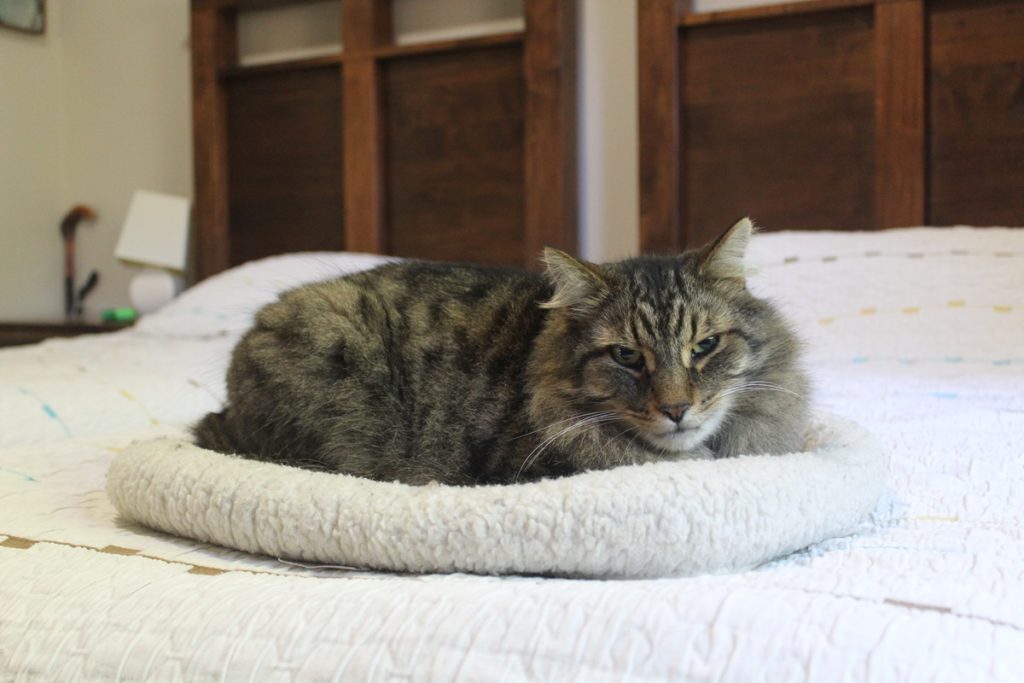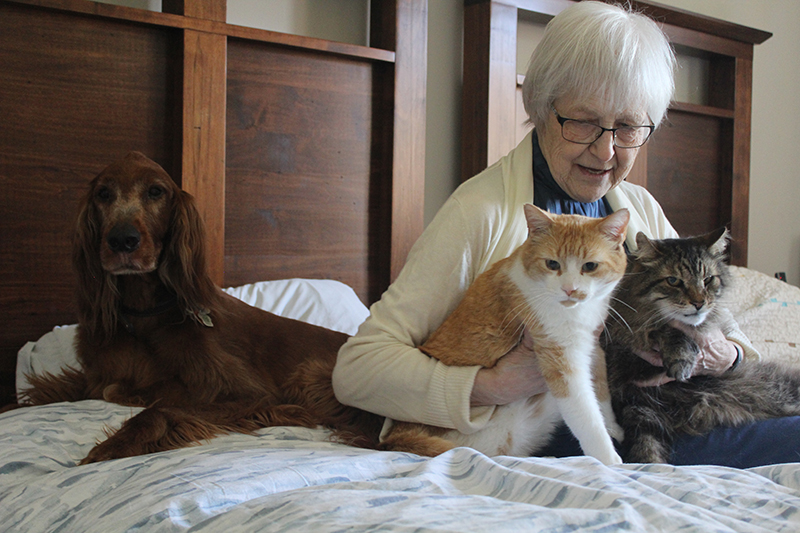Animal Chatter
by Iris Winston
I know that Freya, my 20-year-old Norwegian forest cat, is near the end of her life. She has oral cancer and the malignant tumor is invading her jaw bone and growing to the point that she is not able to close her mouth completely.

Certainly, this means that her quality of life has declined, but does it mean that she is ready to go? Is this the time that I should make the irrevocable decision to euthanize her? Always an incredibly hard decision, it is even harder when she still seems to enjoy many of the activities that have been her normal routine for years.
She still tags along when I take my dog for her daily walks. She still comes to join me in bed and cuddle for a while before moving to her own little bed at my feet. She is still eating and drinking, waking from even the deepest sleep to run into the kitchen as soon as she hears me unzip a can of cat food.
She is sleeping more (even longer than the 15 or 16 hours that cats usually slumber in a day). This is partly because of her age and partly because of the sedative quality of the medication intended to counteract any pain caused by the cancer. She was also given a shot of antibiotics, effective for two weeks at a time, to deal with a secondary infection around her mouth and throat, which may make her sleepier.
The most obvious sign of her declining health, apart from the malignant growth, is that she dribbles on the fur on her chest and has difficulty grooming her bib. This is where I come in to clean her up and to remove matts in her fur. Meanwhile, she continues to wash her face after eating and is still keen to go outside, albeit for much shorter trips than in her youth.
I know that Freya’s cancer is terminal and that she doesn’t have much time left, but, as long as the good days outweigh the bad, I can’t bring myself to shorten however many days she has left—not yet. Euthanasia—a good and peaceful death—is the route I have chosen for other loved animals. But, in those cases, the timing was much easier. A critical injury, sudden paralysis, great loss of weight or retreat to dark places and total lack of interest in the outside world are all signs that make the choice clearer.
Not so with Freya. As a friend put it the other day, she is still being Freya and is still interested in the world around her.

From my daughter’s perspective, euthanasia would make more sense sooner than later. As a veterinary surgeon specializing in oncology, she knows the road ahead goes sharply downhill. Surgery would be a possibility for a younger cat (though, even discounting her age and the financial aspect, the thought of disfiguring Freya to the tune of removing half her jaw is abhorrent to me).
My son-in-law, a large-animal vet, assures me that I will know when the time has come for Freya’s final farewell. And I do believe that euthanasia is the humane way to spare an animal suffering and misery. But, because I am not convinced that Freya is at the point where her life has become a burden to her, I cannot say goodbye just yet. The days or weeks of palliative care will be short and maintaining the balance of keeping her free of pain and worrying that I am keeping her alive for her sake and not for mine by waiting too long takes its toll.
My understanding veterinarian has set up appointments for one and two weeks ahead, in case Freya’s condition deteriorates sharply. She told me to feel free to cancel the first if nothing has changed, but to make sure to keep the second. At that time, Freya will either be injected with another dose of antibiotics or with a heavy sedative followed by the life-ending needle.
As dog behaviourist and psychologist Stanley Coren says, it is probably a blessing that the animals we love don’t live any longer than they do or we would never get over losing them.
* Freya’s life ended a few days after Iris wrote this column.
Almonte, Ontario, writer Iris Winston is a former executive director of the Canadian Federation of Humane Societies. She has been an animal lover all her life. Her pets have always been important members of her family.






